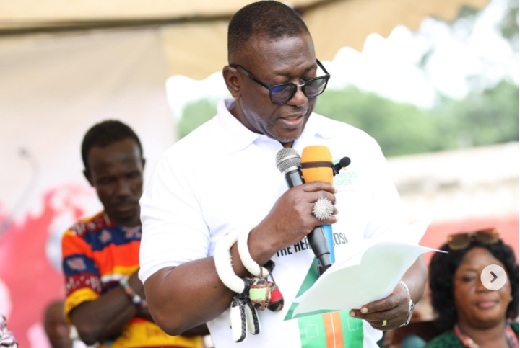Wellness Bridge Initiative (WBI) has reaffirmed its commitment to ensuring that every person knows their health status and is empowered to make informed decision to live a fuller and longer life.
This statement was made with the launch of a preventive health project called the “Health Kiosk” initiative in Adidome. The innovative community-based health initiative spearheaded by Wellness Health Initiative (WBI) aims to address the rising cases of noncommunicable diseases (NCDs) such as hypertension and diabetes in the Volta Region.
View this post on Instagram
Speaking at the launch, Togbe Kwasinyi Kakaklolo Agyeman V, Executive Director of Wellness Bridge Initiative who is also the Chief of Adidome, described the project as “a candle of hope” for his community. He said “The Health Kiosk Project is designed to offer preventive health solutions to the people, starting with Adidome and scaling up to all five sub-districts of the Central Tongu Health Directorate, and further extended to other parts of Ghana”.
According to global and national health data, hypertension and diabetes are silent killers affecting millions, with many unaware of their status. In an article published by John Hopkins Nursing, “Hypertension tops all adult hospital admissions and is associated with a significant proportion of overall adult deaths in hospitals in Ghana” Togbe stressed.
He bemoaned the insurgency of hypertension and diabetes incidents and related fatalities and the disabilities it is causing to the younger population. “Funeral posters with those screaming inscriptions like “What a Shock; “Gone too Soon”; “Painful Exit”, etc. etc. are becoming too common. Let us deal with it.”
View this post on Instagram
The Health Kiosk initiative will operate on Wellness Bridge Initiative’s four strategic pillars known as ACNE. The first pillar being Awareness: This will be based on health education campaigns.
The second pillar is Checking to know your status: This involves providing free screenings for blood pressure and blood sugar and do referrals when necessary. The third pillar is Nutrition: WBI will promote dietary literacy using local foods, tagged, “We are what we Eat”. The fourth and last pillar is Physical Exercise: WBI will encourage community fitness programs across all ages, with particular attention to the aging (50+) in a campaign known as “Age is a Number”.
Acknowledging the support from the Central Tongu District Directorate of the Ghana Health Services (GHS), the Executive Director emphasized the need to deepen the collaboration with the GHS at the national level as the project expands. Togbe Agyeman further acknowledged the Mafi Adidome Development Advisory Board (MADAB) and individual donors who helped finance the first kiosk.
He appealed to international donors, government agencies, corporate institutions, and philanthropists to support the expansion of this wellness initiative nationwide as this project provides solution to the UN SDG3.
In concluding, Togbe Kwasinyi Kakaklolo Agyeman V, said, “we have the vision, we have the plan. What we now seek is the fuel to expand, operate sustainably, and reach every corner of Ghana and beyond”, the Executive Director emphasized.
Dignitaries who attended the event included the Commissioner and Volta Representative to the NDPC, Dr. Elikplim Kwabla Apetorgbor, who chaired the event, the DCE of Central Tongu, Hon. Adison Dodzie Mornyuie, the District Director of Health Service, Mr. Baba Awuni and Chiefs and Queenmothers (including the Queenmother of Adidome, Mama Drapey), the Media, leaders and members of the community. In his remarks, Dr. Apetorgbor described the project as innovative. He said “if there was any award today in recognition for traditional innovation, I will ask everyone to vote for Togbe Kwasinyi Kakaklolo Agyeman V.
The Health Kiosk Project is focused on serving as a hub for free health screenings such as blood pressure, blood sugar, and body mass index, in a tripartite arrangement which will see the District Health Directorate providing training and supervision of the attendants of the Health Kiosk, and the Health Kiosk will screen and refer patients at risk to the Adidome District Hospital for proper diagnosis and treatment.





